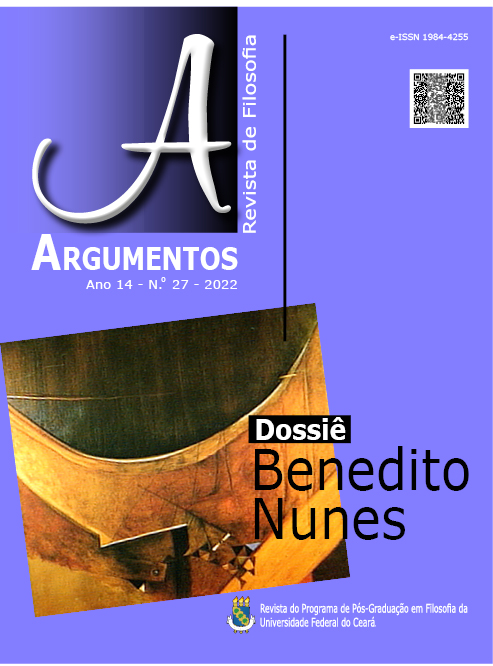University and regionalism in Benedito Nunes
DOI:
https://doi.org/10.36517/Argumentos.27.2Keywords:
Amazônia. Naturalism. Regionalism. University.Abstract
The Present work has for objective to present some reflections regarding thematic in question, taking for base the inaugural lesson presented by the professor Benedict Nunes in April of 1999, involving a phase daily pay-college student and the existence of a local intelegentsia in the Amazônia, inspired for the regionalism, and that it, influenced of decisive form the creation of the Federal Univrsity of Pará.
References
CUNHA, Euclides da. Um paraíso perdido: ensaios, estudos e pronunciamentos sobre a Amazônia. Rio de Janeiro: José Olímpio, 1994.
FIGUEIREDO, Aldrin Moura de; NUNES, Benedito. Luzes e sombras do Iluminismo paraense. In: BEZERRA NETO, José Maria; GUZMÁN, Décio de Alencar (Orgs.). Terra Matura. Historiografia & História Social na Amazônia. Belém: Paka-Tatu, 2002.
NUNES, Benedito. Universidade e regionalismo (Aula inaugural do ano de 1999). Belém: DAVES/UFPA: 1999.
SOUZA, Inglês de. Contos Amazônicos. São Paulo: Martin Claret, 2012.
Downloads
Published
Issue
Section
License
Argumentos magazine is licensed under an International Creative Commons Attribution License.
The Magazine uses CC BY inclusion
1) The authors retain the copyright granted to the magazine or the right to initial publication, with the work regularly licensed under the Creative Commons Attribution, which allows the sharing of the work with acknowledgment of authorship and initial publication in this magazine.
2) The authors are authorized to contract additional applicable contracts, for non-exclusive distribution of the version of the work published in this journal (for example, publication in the institutional repository or as a chapter of the book), recognition of authorship and initial publication in this journal.
3) Authors are authorized and encourage to publish and distribute their work online (for example, in institutional repositories or on their personal pages) at any time before or during the editorial process, as they can generate productive changes, as well as increase the impact and reference of published work.




.jpg)










._._3.png)
1.jpg)
._._._.png)
